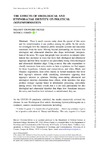Mostrar o rexistro simple do ítem
The Effects of Ideological and Ethnoracial Identity on Political (Mis)Information
| dc.contributor.author | Crowder-Meyer, Melody | |
| dc.contributor.author | Ferrín, Mónica | |
| dc.date.accessioned | 2022-04-11T17:49:39Z | |
| dc.date.available | 2022-04-11T17:49:39Z | |
| dc.date.issued | 2021 | |
| dc.identifier.citation | Melody Crowder-Meyer, Mónica Ferrín, The Effects of Ideological and Ethnoracial Identity on Political (Mis)Information, Public Opinion Quarterly, Volume 85, Issue 3, Fall 2021, Pages 753–779, https://doi.org/10.1093/poq/nfab038 | es_ES |
| dc.identifier.issn | 1537-5331 | |
| dc.identifier.issn | 0033-362X | |
| dc.identifier.uri | http://hdl.handle.net/2183/30446 | |
| dc.description.abstract | [Abstract] There is much concern today about the spread of fake news and the misinformation it can produce among the public. In this article, we investigate how the American public interprets accurate and inaccurate statements from the news. Moving beyond partisanship, we theorize that ideological and ethnoracial identities also shape individuals’ interpretations of the news. We argue that people have incentives to interpret information they encounter in ways that favor their ideological and ethnoracial ingroups and that these incentives are particularly strong when ideological and ethnoracial identities align. Using a survey that asks respondents to classify statements from news stories as facts or opinions, we find support for these hypotheses. Liberals and conservatives, and white, Black, and Hispanic respondents, more often classify as factual statements that favor their ingroup’s interests while classifying information opposing their ingroup’s interests as opinions. Holding cross-cutting ethnoracial and ideological identities diminishes these effects, while identities that align produce stronger ingroup biases in information processing, particularly among whites. Our study reveals that it is not only partisanship but also ideological and ethnoracial identities that shape how Americans interpret the news, and therefore how informed, or misinformed, they are. | es_ES |
| dc.language.iso | eng | es_ES |
| dc.publisher | Oxford University Press | es_ES |
| dc.relation.uri | https://doi.org/10.1093/poq/nfab038 | es_ES |
| dc.rights | Atribución-NoComercial 4.0 International (CC BY-NC 4.0) | es_ES |
| dc.rights.uri | https://creativecommons.org/licenses/by-nc/4.0/ | * |
| dc.title | The Effects of Ideological and Ethnoracial Identity on Political (Mis)Information | es_ES |
| dc.type | info:eu-repo/semantics/article | es_ES |
| dc.rights.access | info:eu-repo/semantics/openAccess | es_ES |
| UDC.journalTitle | Public Opinion Quarterly | es_ES |
| UDC.volume | 85 | es_ES |
| UDC.issue | 3 | es_ES |
| UDC.startPage | 753 | es_ES |
| UDC.endPage | 779 | es_ES |
| dc.identifier.doi | 10.1093/poq/nfab038 |
Ficheiros no ítem
Este ítem aparece na(s) seguinte(s) colección(s)
-
GI-ESOMI - Artigos [111]






